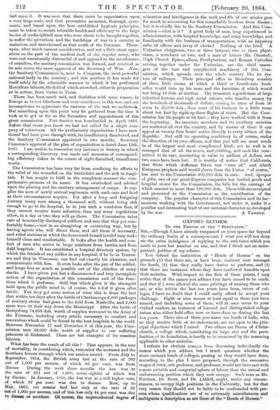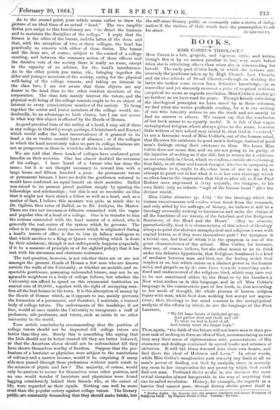OXFORD REFORM.
To THE EDITOR OF THE "SPECTATOR."
SIR,--Though I have already trespassed on your space far beyond the ordinary limits of a correspondent, I trust you will not deny the the extra indulgence of replying to the strictures which you made in your last number on one, and that I think not an unim- portant, portion of my scheme.
You defend the institution of "Heads of Houses" on the grounds (1) that there are, or have been, eminent men amongst the heads, (2) that they really have duties to perform, and (3) that there are instances where they have conferred benefits upon their societies. With respect to the first of these points, I may notice that of the names you adduce four have ceased to be heads, and that if I were allowed the same privilege of naming those who are, or who within the last ten years have been, tutors of col- leges, I have no doubt that I could easily afford to accept your challenge. Eight or nine names at least equal to those you have named, and including some of them, will at once occur to your Oxford readers, as instances of learned and distinguished college tutors who either hold office now or have done so during the last ten years. Three also of those you name are heads of halls, who, as they receive little or no endowment, are not open to the prin- cipal objections which I raised. Two others are Deans of Christ- church, a college which, considering its large size and the pecu- liarities of its foundation, is hardly to be measured by the reasoning applicable to other societies.
I refrain for obvious reasons from discussing individually the names which you adduce, but I much question whether the more eminent heads of colleges, passing as they would have done, according to the plan I have proposed, through the successive stages of tutor, sub-professor, and professor, would not have met with a more suitable and congenial sphere of labour than the unreal and embarrassing position which they now occupy. Such men as Mr. Pattison, Dr. Scott, and Dr. Liddell, ought, under any circum- stances, to occupy high positions in the University, but for that very reason they should not be liable to be confounded with per- sons whose qualifications are of so extremely miscellaneous and ambiguous a description as are those of the "Heads of Houses." As to the second point, your article seems rather to draw the picture of an ideal than of an actual "head." The two tangible duties you assign to this functionary are "to direct the business and to maintain the discipline of the college." I reply that the former is the office of the bursar, and the latter of the dean, and that, with the exception of two or three colleges, the head has practically no concern with either of these duties. The bursar and the dean are, of course, subject to the control of a college meeting, and between the summary action of these officers and the decisive vote of the society there is really no room, except in the capacity of an adviser, for the head's interference. As to the other points you name, viz., bringing together the older and younger members of the society, caring for the physical well-being of the college tenants, and taking an interest in the class lists, I am not aware that those objects are any dearer to the head than to the other resident members of the corporation. The class lists mainly interest the tutors, and the physical well-being of the college tenants ought to be an object of interest to every conscientious member of the society. To bring together the senior and junior members of the college would, un- doubtedly, be an advantage to both classes, but I am not aware in what way this object is effected by the Heads of Houses.
As good practical tests of the utility of a head, I may ask if there is any college in Oxford (except, perhaps, Christchurch and Exeter) which would suffer the least inconvenience if it granted to its head a six or twelve months' leave of absence ; or if the colleges in which the head notoriously takes no part in college business are not as prosperous as those in which he affects to interfere.
We are told that three heads of colleges have conferred great benefits on their societies. One has almost doubled the revenues of his college. I have heard of a bursar who has done the same ; but it is not thought necessary to reward him with a large house and fifteen hundred a year. As permanent tutors or permanent bursars, I have no doubt the gentlemen referred to would have conferred an equal benefit on their societies. Balliol was raised to its present proud position simply by opening the fellowships and scholarships ; but this is not so recondite an idea that it might not have struck a fellow as well as a head, and, as a matter of fact, I believe this measure was quite as much due to Dr. Ogilvie, then tutor of Balliol, as to Dr. Jenkyns, the Master. There are two not uncommon fallacies connected with the vague and popular idea of a head of a college. One is to transfer to him the notions connected with the head master of a school, who is generally the real centre of the system which he governs. The other is to suppose that every measure which is originated during a head's tenure of office is due to him (a fallacy analogous to that which ascribes to a King or Queen everything which is done by their ministers), though it not unfrequently happens (especially if it be a measure of principle or of far-sighted policy) that it has met with his strenuous and obstinate resistance.
The real question, however, is not whether there are or are not amongst the present Heads of Houses a few men who are known outside the walls of the University, or whether an amiable and re- spectable gentleman, possessing unbounded leisure, may not be an agreeable neighbour to a body of college fellows, but whether the University can afford to spend on this ornamental institution an annual sum of 30,000/., together with the right of occupying rent- free all the best houses in the town. It is this absorption of money by the Heads of Houses which, as it appears to me, mainly prevents the formation of a permanent, and therefore, I maintain, a learned body of college tutors. The endowments of the headships, if set free, would at once enable the University to inaugurate a staff of professors, sub-professors, and tutors, such as exists in no other university in the world.
Your article concludes by recommending that the position of college tutors should not be improved till college tutors are better than they are. Surely this is something like saying that the Irish should not be better treated till they are better behaved, or that the American slaves should not be enfranchised till they have shown themselves worthy of freedom. Suppose that the pro- fessions of a barrister or physician were subject to the restrictions of celibacy and a narrow income, would it be surprising if many able men passed through these professions without much result to the sciences of physic and law ? The majority, of course, would only be anxious to secure for themselves some other position, and no one would wonder if barristers and physicians were found lagging considerably behind their friends who, at the outset of life, were regarded as their equals. Nothing can well be more cruel than the popular outcry against college tutors. The literary public are constantly demanding that they should make bricks, but the self-same literary public as constantly raise a storm of indig- nation if the victims of their wrath have the presumption to ask































 Previous page
Previous page